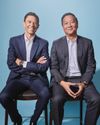Owning stock in a well-run, socially responsible company is a way of making a statement. Owning stock in a bunch of responsible companies is a recipe for beating the market.

BACK IN 2012, when Andreas INVEST Feiner and his colleagues at asset management startup Arabesque first began pitching investors about including environmental, social, and governance factors (ESG) in their investing decisions, they encountered plenty of skepticism, not to mention eye rolls, sidelong glances, and crooked looks. Investors, recalls Feiner, believed that “if you do something right, you have to pay for it” by accepting smaller profits and lower returns.
A lot can change in six years. Today there’s a growing body of evidence showing that companies that put social responsibility first can also finish first in the market. The question is no longer whether you can do well while doing good, but how best to distinguish the do-gooders from the also-rans. (To learn about 63 companies that fit in the first category, see the Change the World list in this issue.) And several companies—including Arabesque, a spinoff of banking giant Barclays— are deploying data to build tools that can help investors build and test their portfolios.
The demand from investors is certainly there: In a recent survey, Bank of America Merrill Lynch found that about 20% of investors—and 50% of those with a five-year time horizon or longer—considered ESG issues in their analysis. Their motives involve both a sense of public responsibility and commonsense self-preservation: When companies make decisions that show respect for the environment, their communities, and their employees, there’s less likelihood that they’ll be hit with the kinds of fines, public backlash, and boardroom turmoil that can slam their share prices.
هذه القصة مأخوذة من طبعة September 2018 من Fortune.
ابدأ النسخة التجريبية المجانية من Magzter GOLD لمدة 7 أيام للوصول إلى آلاف القصص المتميزة المنسقة وأكثر من 9,000 مجلة وصحيفة.
بالفعل مشترك ? تسجيل الدخول
هذه القصة مأخوذة من طبعة September 2018 من Fortune.
ابدأ النسخة التجريبية المجانية من Magzter GOLD لمدة 7 أيام للوصول إلى آلاف القصص المتميزة المنسقة وأكثر من 9,000 مجلة وصحيفة.
بالفعل مشترك? تسجيل الدخول

KKR'S $1 TRILLION GAMBLE
The co-CEOs of KKR have a radical strategy to supercharge growth - and chart a path far different from that of their mentors, Henry Kravis and George Roberts.

THE SHIPWRECKED LEGACY OF MIKE LYNCH
THE BRITISH TECH MOGUL SOLD HIS COMPANY FOR $11 BILLION, THEN SPENT YEARS FIGHTING FRAUD CHARGES. HIS SHOCKING DEATH HAS LEFT MANY UNANSWERED QUESTIONS ABOUT HIS LIFE.

FORTUNE - CHANGE THE WORLD
THESE COMPANIES BUILD BUSINESSES AROUND SOLVING SOCIAL PROBLEMS AND THEY DO WELL BY DOING GOOD.

Can Cathy Engelbert Handle the Pressure?
The WNBA commissioner and ex-Deloitte CEO is leading the league through a season of historic highs, but critics wonder if her game plan is good enough to seize the moment.

Kamalanomics: Harris's Road Map for Business
Vice President Kamala Harris hasn't done much to woo Big Business. Many executives would still rather take their chances with her than the alternative.

Mary Barra
The CEO of General Motors accelerates into our top spot.

MPW - MOST POWERFUL WOMEN 2024
WHEN FORTUNE launched its Most Powerful Women list in 1998, women were just starting to trickle into the C-suite in significant numbers.

WHO HAS TIME FOR A POWER LUNCH? THE REAL BUSINESS HAPPENS AT 4 P.M. 'POWER HOUR.'
THE SUN is pouring in through the floor-to-ceiling windows when the bar begins to fill with bespoke suits on a Tuesday in August at Four Twenty Five. The new restaurant from Jean-Georges Vongerichten is on the first floor of a Midtown Manhattan skyscraper, beneath the offices of financial giant Citadel Securities. And the traders are thirsty.

HOW TO TAKE ADVANTAGE OF THE FED'S BIG RATE CUT
THE WAIT IS OVER. After more than a year of will-they-or-won't-they, the Federal Reserve on Sept. 18 announced the first cut to its benchmark Federal funds rate since the early days of the COVID-19 pandemic, a 50-basis-point drop that Chairman Jerome Powell signaled is likely the first of many.

FOR GEN Z AT WORK, THE GENERATION GAP IS A WELLNESS GAP. HERE'S HOW TO BRIDGE IT
FOR ONE nonprofit executive director, it was a 2022 New York City subway shooting that highlighted the stark differences between how he, a 55-year-old, and his Gen Z staffers show up to work.